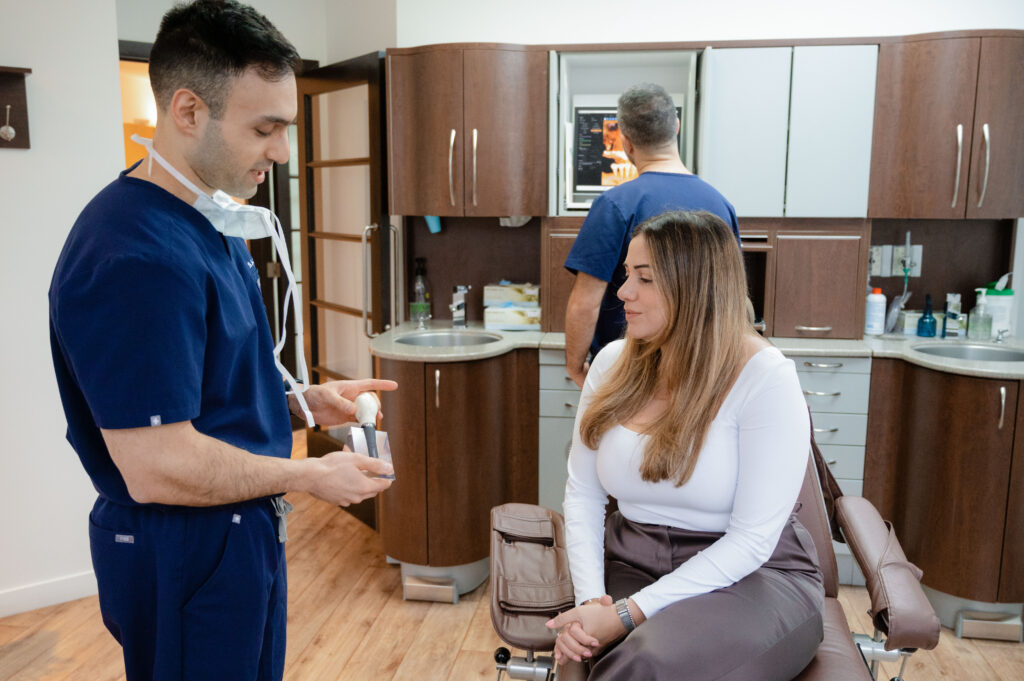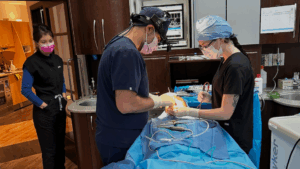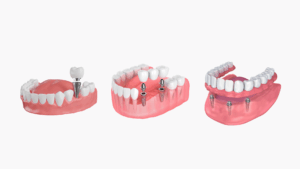Dans l’univers de l’implantologie moderne, la préparation à la chirurgie des implants dentaires est une étape aussi cruciale que l’intervention elle-même. Que vous soyez un dentiste généraliste ou un spécialiste en implantologie, accompagner vos patients de manière proactive avant l’implantation peut faire toute la différence sur le plan clinique et humain.
Ce guide s’inspire des standards internationaux, dont ceux des Centres Zygoma ZAGA, pour vous aider à maîtriser chaque étape de la préparation préopératoire.
Pourquoi une bonne préparation avant des implants dentaires est-elle essentielle?
Une chirurgie réussie repose d’abord sur un patient bien préparé. Une préparation rigoureuse pour les implants dentaires contribue à :
- Réduire les risques de complications post-opératoires
- Favoriser une meilleure ostéointégration
- Améliorer la satisfaction et la coopération du patient
- Prolonger la durée de vie des implants
Prendre soin d’informer, rassurer et préparer physiquement vos patients est la clé du succès.

Comprendre les émotions et les attentes du patient
Avant même d’entrer en salle opératoire, vos patients doivent se sentir écoutés et compris.
Les patients abordent la chirurgie avec une gamme d’émotions : excitation, peur et espoir. Le rôle du professionnel est de démystifier la procédure, répondre à leurs questions sur les implants dentaires et de les rassurer à chaque étape.
Un patient bien informé est un patient plus confiant.
Financer la pose d’implants dentaires au Canada : options et conseils pratiques
Si les implants dentaires représentent une solution durable et esthétique pour remplacer des dents manquantes, leur coût peut représenter un obstacle pour plusieurs patients.
Toutefois, au Canada, plusieurs options existent pour alléger la charge financière liée à la mise en place d’un implant dentaire, qu’il s’agisse d’une prothèse fixe, d’un pont ou d’une couronne sur implant.
Le Régime canadien de soins dentaires (RCSD)
Depuis 2024, le RCSD élargi couvre partiellement certains actes liés à la dentisterie, incluant l’évaluation et le traitement pré-implantaire dans des cas précis. Bien que les implants eux-mêmes ne soient pas systématiquement pris en charge, la consultation initiale, les examens radiographiques, ou la préparation de la gencive et de l’os de la mâchoire peuvent être partiellement couverts.
Conseil : Encouragez vos patients à vérifier leur admissibilité au RCSD afin de maximiser les avantages disponibles.
Déductions fiscales et crédits d’impôt
Au Canada, les dépenses liées à certains traitements dentaires, y compris les implants, sont admissibles à des déductions fiscales.
Si un patient paie une prothèse dentaire fixe, une couronne, un pilier ou tout autre composant implanté (comme une vis en titane), il peut réclamer ces coûts dans sa déclaration de revenus sous forme de frais médicaux.
Cela inclut les frais de chirurgie, les matériaux utilisés, ainsi que les actes liés à la restauration de la fonction masticatoire de la bouche.
 Plans de paiement échelonnés
Plans de paiement échelonnés
De nombreuses cliniques au Québec et partout au Canada offrent désormais des plans de paiement pour faciliter l’accès aux implants dentaires. Ces programmes permettent aux patients de financer leur traitement sur plusieurs mois, voire années, selon leur situation personnelle.
Mieux informer pour mieux décider
Il est important que le patient comprenne qu’un implant dentaire ne remplace pas uniquement une dent naturelle absente, mais également sa racine, ce qui préserve l’os et soutient la structure de la mâchoire. Ce service contribue ainsi non seulement à l’apparence du sourire, mais aussi à la fonction masticatoire, au confort, et à la santé globale.
Conseil final : Lors du rendez-vous initial, discutez ouvertement des solutions de financement.

Consultation initiale : Première étape vers le succès implantaire
Voici les points clés à aborder lors de la première rencontre :
- Évaluation complète de la santé bucco-dentaire et générale
- Analyse des attentes fonctionnelles et esthétiques
- Présentation des différentes options d’implants dentaires
- Explication du plan de traitement à l’aide de visuels 3D et de témoignages patients
Cette phase permet d’établir un lien de confiance et d’assurer une meilleure adhésion au traitement.
Informer le patient : Documentation et ressources à fournir
Offrez des documents clairs et validés, comme :
- Articles vulgarisés sur les implants dentaires
- Guides postopératoires illustrés
- Vidéos explicatives
- Témoignages d’anciens patients
Une information précise améliore l’implication du patient et réduit ses peurs.
Le processus complet des implants dentaires en 25 étapes à partager avec vos patients
Deux semaines avant la chirurgie : Préparation physique et organisationnelle
1. Vérification des prescriptions médicales et des tests préopératoires
CBC, HbA1c ou autres selon l’état de santé.
2. Arrêt du tabac et des produits contenant de la nicotine
Pour assurer une meilleure intégration osseuse des implants dentaires.
3. Suspension temporaire de certains suppléments
Oméga-3, vitamine E et autres pouvant affecter la coagulation.
4. Organisation d’un accompagnement le jour de la chirurgie
Le patient ne doit pas repartir seul après l’intervention.
Technologie et planification implantaire : Un duo gagnant
5. Utilisation de la planification numérique 3D
Pour une pose chirurgicale précise et sécuritaire des implants dentaires.
6. Création de guides chirurgicaux personnalisés
Réduction des marges d’erreur et gain de confiance pour le chirurgien et le patient.
Une semaine avant la chirurgie : Derniers ajustements
7. Prescription éventuelle d’antibiotiques prophylactiques
Selon les antécédents médicaux.
8. Réduction de la consommation d’alcool et de caféine
Pour favoriser un bon métabolisme préopératoire.
9. Renforcement de l’hygiène bucco-dentaire
Un environnement buccal sain diminue le risque d’infection.
10. Préparation des fournitures post-chirurgicales
Glace, médicaments prescrits, nourriture molle, brosse à dents douce.
La veille de la chirurgie des implants dentaires : Optimiser les conditions
11. Reconfirmer l’heure et les détails du rendez-vous
Préparer les documents et prévoir les transports.
12. Préparer des repas adaptés pour les jours suivants
Soupes, compotes, smoothies.
13. Respect du jeûne si requis
Généralement 8 à 12 heures selon le protocole.
14. Favoriser un sommeil de qualité
Pour maximiser la réponse immunitaire et diminuer le stress.
Le matin de la chirurgie : Conseils essentiels
15. Repas léger ou jeûne
Selon les recommandations du chirurgien, consommer un repas léger ou rester à jeun.
16. Hygiène matinale soignée
Se brosser les dents doucement sans utiliser de rince-bouche sauf indication contraire.
17. Porter des vêtements confortables
Opter pour des habits amples et sans bijoux.
18. Arriver à l’avance
Arriver 15 minutes plus tôt évite le stress de dernière minute.
Post-opératoire : Assurer la réussite des implants dentaires
19. Gestion efficace de la douleur
Analgésiques, glace, repos.
20. Hygiène adaptée en post-opératoire
Rinçages doux, pas de brossage direct sur la zone opérée.
21. Surveillance des signes d’infection
Fièvre, douleur excessive, gonflement prolongé = alerte.
Mode de vie durant la période de récupération
22. Alimentation molle et tiède
Ex. : soupe, purée, yogourt, compote.
23. Éviter les efforts physiques intenses
Favoriser le repos pendant quelques jours.
24. Hydratation régulière
Boire de l’eau aide à éliminer les toxines et favorise la guérison.
25. Respecter les rendez-vous de suivi
Vérification de l’ostéointégration et ajustement au besoin.
Conclusion : Préparer un patient aux implants dentaires, c’est poser les fondations d’un succès durable
La préparation à la chirurgie des implants dentaires va bien au-delà de l’acte chirurgical. Elle repose sur l’éducation, la communication et une planification méticuleuse.
En adoptant une approche centrée sur le patient et en suivant ces étapes clés, vous optimisez non seulement le taux de réussite des implants dentaires, mais vous bâtissez également une relation de confiance durable avec vos patients.
Les implants dentaires représentent bien plus qu’une solution technique – ils redonnent aux patients confort, assurance et qualité de vie.
Dans l’univers de l’implantologie moderne, la préparation à la chirurgie des implants dentaires est une étape aussi cruciale que l’intervention elle-même. Que vous soyez un dentiste généraliste ou un spécialiste en implantologie, accompagner vos patients de manière proactive avant l’implantation peut faire toute la différence sur le plan clinique et humain.
Ce guide s’inspire des standards internationaux, dont ceux des Centres Zygoma ZAGA, pour vous aider à maîtriser chaque étape de la préparation préopératoire.
Pourquoi une bonne préparation avant des implants dentaires est-elle essentielle?
Une chirurgie réussie repose d’abord sur un patient bien préparé. Une préparation rigoureuse pour les implants dentaires contribue à :
- Réduire les risques de complications post-opératoires
- Favoriser une meilleure ostéointégration
- Améliorer la satisfaction et la coopération du patient
- Prolonger la durée de vie des implants
Prendre soin d’informer, rassurer et préparer physiquement vos patients est la clé du succès.

Comprendre les émotions et les attentes du patient
Avant même d’entrer en salle opératoire, vos patients doivent se sentir écoutés et compris.
Les patients abordent la chirurgie avec une gamme d’émotions : excitation, peur et espoir. Le rôle du professionnel est de démystifier la procédure, répondre à leurs questions sur les implants dentaires et de les rassurer à chaque étape.
Un patient bien informé est un patient plus confiant.
Financer la pose d’implants dentaires au Canada : options et conseils pratiques
Si les implants dentaires représentent une solution durable et esthétique pour remplacer des dents manquantes, leur coût peut représenter un obstacle pour plusieurs patients.
Toutefois, au Canada, plusieurs options existent pour alléger la charge financière liée à la mise en place d’un implant dentaire, qu’il s’agisse d’une prothèse fixe, d’un pont ou d’une couronne sur implant.
Le Régime canadien de soins dentaires (RCSD)
Depuis 2024, le RCSD élargi couvre partiellement certains actes liés à la dentisterie, incluant l’évaluation et le traitement pré-implantaire dans des cas précis. Bien que les implants eux-mêmes ne soient pas systématiquement pris en charge, la consultation initiale, les examens radiographiques, ou la préparation de la gencive et de l’os de la mâchoire peuvent être partiellement couverts.
Conseil : Encouragez vos patients à vérifier leur admissibilité au RCSD afin de maximiser les avantages disponibles.
Déductions fiscales et crédits d’impôt
Au Canada, les dépenses liées à certains traitements dentaires, y compris les implants, sont admissibles à des déductions fiscales.
Si un patient paie une prothèse dentaire fixe, une couronne, un pilier ou tout autre composant implanté (comme une vis en titane), il peut réclamer ces coûts dans sa déclaration de revenus sous forme de frais médicaux.
Cela inclut les frais de chirurgie, les matériaux utilisés, ainsi que les actes liés à la restauration de la fonction masticatoire de la bouche.
 Plans de paiement échelonnés
Plans de paiement échelonnés
De nombreuses cliniques au Québec et partout au Canada offrent désormais des plans de paiement pour faciliter l’accès aux implants dentaires. Ces programmes permettent aux patients de financer leur traitement sur plusieurs mois, voire années, selon leur situation personnelle.
Mieux informer pour mieux décider
Il est important que le patient comprenne qu’un implant dentaire ne remplace pas uniquement une dent naturelle absente, mais également sa racine, ce qui préserve l’os et soutient la structure de la mâchoire. Ce service contribue ainsi non seulement à l’apparence du sourire, mais aussi à la fonction masticatoire, au confort, et à la santé globale.
Conseil final : Lors du rendez-vous initial, discutez ouvertement des solutions de financement.

Consultation initiale : Première étape vers le succès implantaire
Voici les points clés à aborder lors de la première rencontre :
- Évaluation complète de la santé bucco-dentaire et générale
- Analyse des attentes fonctionnelles et esthétiques
- Présentation des différentes options d’implants dentaires
- Explication du plan de traitement à l’aide de visuels 3D et de témoignages patients
Cette phase permet d’établir un lien de confiance et d’assurer une meilleure adhésion au traitement.
Informer le patient : Documentation et ressources à fournir
Offrez des documents clairs et validés, comme :
- Articles vulgarisés sur les implants dentaires
- Guides postopératoires illustrés
- Vidéos explicatives
- Témoignages d’anciens patients
Une information précise améliore l’implication du patient et réduit ses peurs.
Le processus complet des implants dentaires en 25 étapes à partager avec vos patients
Deux semaines avant la chirurgie : Préparation physique et organisationnelle
1. Vérification des prescriptions médicales et des tests préopératoires
CBC, HbA1c ou autres selon l’état de santé.
2. Arrêt du tabac et des produits contenant de la nicotine
Pour assurer une meilleure intégration osseuse des implants dentaires.
3. Suspension temporaire de certains suppléments
Oméga-3, vitamine E et autres pouvant affecter la coagulation.
4. Organisation d’un accompagnement le jour de la chirurgie
Le patient ne doit pas repartir seul après l’intervention.
Technologie et planification implantaire : Un duo gagnant
5. Utilisation de la planification numérique 3D
Pour une pose chirurgicale précise et sécuritaire des implants dentaires.
6. Création de guides chirurgicaux personnalisés
Réduction des marges d’erreur et gain de confiance pour le chirurgien et le patient.
Une semaine avant la chirurgie : Derniers ajustements
7. Prescription éventuelle d’antibiotiques prophylactiques
Selon les antécédents médicaux.
8. Réduction de la consommation d’alcool et de caféine
Pour favoriser un bon métabolisme préopératoire.
9. Renforcement de l’hygiène bucco-dentaire
Un environnement buccal sain diminue le risque d’infection.
10. Préparation des fournitures post-chirurgicales
Glace, médicaments prescrits, nourriture molle, brosse à dents douce.
La veille de la chirurgie des implants dentaires : Optimiser les conditions
11. Reconfirmer l’heure et les détails du rendez-vous
Préparer les documents et prévoir les transports.
12. Préparer des repas adaptés pour les jours suivants
Soupes, compotes, smoothies.
13. Respect du jeûne si requis
Généralement 8 à 12 heures selon le protocole.
14. Favoriser un sommeil de qualité
Pour maximiser la réponse immunitaire et diminuer le stress.
Le matin de la chirurgie : Conseils essentiels
15. Repas léger ou jeûne
Selon les recommandations du chirurgien, consommer un repas léger ou rester à jeun.
16. Hygiène matinale soignée
Se brosser les dents doucement sans utiliser de rince-bouche sauf indication contraire.
17. Porter des vêtements confortables
Opter pour des habits amples et sans bijoux.
18. Arriver à l’avance
Arriver 15 minutes plus tôt évite le stress de dernière minute.
Post-opératoire : Assurer la réussite des implants dentaires
19. Gestion efficace de la douleur
Analgésiques, glace, repos.
20. Hygiène adaptée en post-opératoire
Rinçages doux, pas de brossage direct sur la zone opérée.
21. Surveillance des signes d’infection
Fièvre, douleur excessive, gonflement prolongé = alerte.
Mode de vie durant la période de récupération
22. Alimentation molle et tiède
Ex. : soupe, purée, yogourt, compote.
23. Éviter les efforts physiques intenses
Favoriser le repos pendant quelques jours.
24. Hydratation régulière
Boire de l’eau aide à éliminer les toxines et favorise la guérison.
25. Respecter les rendez-vous de suivi
Vérification de l’ostéointégration et ajustement au besoin.
Conclusion : Préparer un patient aux implants dentaires, c’est poser les fondations d’un succès durable
La préparation à la chirurgie des implants dentaires va bien au-delà de l’acte chirurgical. Elle repose sur l’éducation, la communication et une planification méticuleuse.
En adoptant une approche centrée sur le patient et en suivant ces étapes clés, vous optimisez non seulement le taux de réussite des implants dentaires, mais vous bâtissez également une relation de confiance durable avec vos patients.
Les implants dentaires représentent bien plus qu’une solution technique – ils redonnent aux patients confort, assurance et qualité de vie.










